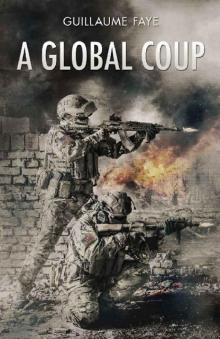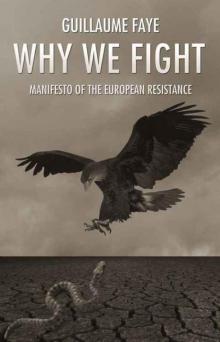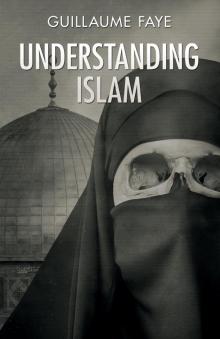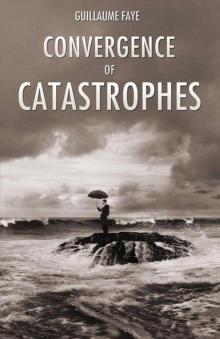Archeofuturism, page 7




3 – The term ‘vitalistic constructivism’ provides an overall worldview and concrete synergic plan linking two mental structures. Through ‘constructivism’ it stands for: historical and political will to power, an aesthetic project of civilisation-building, and the Faustian spirit. Through ‘vitalism’ it stands for: realism, an organic and non-mechanistic mentality, respect for life, self-discipline based on autonomous ethics, humanity (the opposite of ‘humanitarianism’), and an engagement with bio-anthropological problems, including those of ethnic groups.
4 – Vitalistic constructivism is the label I suggest we use to positively define what used to be called – for want of a better term – anti-egalitarianism.
Besides, anti-egalitarianism only defined its project within the vague and purely descriptive conceptual framework of postmodernity. The label I suggest to describe the central ideological plan of vitalistic constructivism is Archeofuturism. This I shall outline further on.
3 – Diagnosis: Modernity Leads to
the Convergence of Catastrophes
In order to define the content of a possible form of Archeofuturism, I must summarise the central points in my critique of modernity. Sprung from secularised evangelism, Anglo-Saxon mercantilism and the individualistic philosophy of the Enlightenment, modernity has managed to carry out its global plan, based on economic individualism, the allegory of Progress, the cult of quantitative development, and the affirmation of abstract ‘human rights’. Yet, this has been a pyrrhic victory, for the plan implemented by this worldview, which seeks to claim the Kingdom of the Earth for itself, has entered a crisis and will probably collapse at the beginning of the next century.[16] After all, the Tarpeian Rock is on the Capitoline Hill.[17]
For the first time in history, humanity is threatened by a convergence of catastrophes.
A series of ‘dramatic lines’ are drawing near: like the tributaries of a river, and will converge in perfect unison at the breaking point (between 2010 and 2020), plunging the world into chaos. From this chaos – which will be extremely painful on a global scale – a new order can emerge based on a worldview, Archeofuturism, understood as the idea for the world of the post-catastrophic age.
Here is a brief outline of the nature of these lines of catastrophe:
1 – The first is the widespread metastasis of the European social fabric. The demographic colonisation of the northern hemisphere by peoples from the South is becoming an increasing problem – despite all the reassuring statements on the part of the media – and one fraught with explosive consequences, associated in particular with the collapse of the Churches in Europe, which has become a land of conquest for Islam; the failure of multiracial society, which is increasingly racist and neo-tribal; the progressive ethno-anthropological metamorphosis of Europe, a veritable historical disaster; the return of poverty in both East and West, and the slow but steady increase in crime and drug consumption; the ongoing disintegration of family structures; the decline of the educational system and the quality of school curricula; the disruption of the passing down of cultural knowledge and social disciplines (barbarisation and incompetence); the disappearance of folk culture and its replacement by the brutishness of masses rendered passive by audio-visual technology (Guy Débord took his own life because he had already foreseen all this in 1967[18] in his book Society of the Spectacle);[19] the progressive decay of cities and communities in favour of sprawling suburbs devoid of all transparency and coherence, where there is no law or safety; endemic urban revolts – like a rampant May of ‘68, only worse; and finally the disappearance of all civil authority in the countries of the former USSR, which are overwhelmed by economic crisis. Meanwhile, nation-states witness their own sovereignty decline and prove incapable of facing poverty, unemployment, crime, illegal immigration, and the growing power of mafias and the corruption of the political class; the creative and productive elites, hit by taxation and increasing economic control, are thus allured by the prospect of moving to America. An increasingly egotistical and savage society on the road to primitivism, paradoxically concealed and counterbalanced by the naive and pseudo-humanistic discourse of ‘hegemonic morality’: this is what is emerging, year after year, and will soon reach a breaking point.
2 – These causes of social collapse will be worsened by an increasingly serious economic and demographic crisis. After 2010 the number of people working will be insufficient to fund the pensioners of the ‘grandpa-boom’. Europe will collapse under the weight of the elderly: countries with an ageing population will witness the slowing down and crippling of their economies, for increasing resources will have be used to pay for health care and the pensions of unproductive citizens; besides, ageing limits techno-economical dynamism. The egalitarian ideology of (old) modernity has prevented any serious engagement with these problems, as it is paralysed by two dogmas: anti-natalism (a form of ethno-masochism), which censures all attempts to voluntarily increase birth rates; and the egalitarian refusal to pass from a social security system based on redistribution to capitalisation (pension funds). The worst is yet to come. Unemployment and poverty will increase, while a small class working in the international marketplace and supported by a class of bureaucrats and office workers with secure positions will live comfortably. Economic horror awaits us. By a perverse process, egalitarianism is engendering a society of socio-economic oppression, thus showing itself to be the opposite of justice, as understood in Platonist terms.[20] Even the socio-democratic welfare state founded on the myth of Progress will collapse, and with a greater crash than the Communist system. Europe is turning into a Third World country. Before us is a time of crisis, or rather: the crumbling of the foundations of the socio-economical structure that has taken the name of civilisation.
America – a vast continent that has witnessed the migration of pioneers, and is used to a culture of brutality and a conflict-driven system based on ethnic and economic ghettoes – appears less vulnerable than Europe and more capable of facing an imbalance, at least when it comes to social stability; it too, however, would not survive a global maelstrom.
3 – The third fracture line of modernity: the chaos of the South. By setting a process of industrialisation in motion that undermined their traditional cultures, the countries of the South, dazzled by a deceptive and uncertain economic growth, created social chaos in their own lands, and now this is growing steadily worse. The recent events in Indonesia are a warning sign.[21] By perspicaciously turning his back on his own ideological family, the Anglo-French businessman Jimmy Goldsmith[22] had perfectly analysed all this: the explosion of huge urban conglomerates (Lagos, Mexico, Rio de Janeiro, Kolkata, Kuala Lumpur...) turning into hellish jungles, the presence of both poverty bordering on slavery and rich, insolent and authoritarian bourgeois minorities protected by ‘armed forces’ from interior repression, thus accelerating environmental destruction, the rise of socio-religious fanaticism, etc. The countries of the South are a powder keg. The recent genocides in central Africa, the increase of bloody civil conflicts in India, Malaysia, Indonesia, Mexico, etc. – which often feed on religious extremism and are sparked by the United States – are only the prelude to a bloody future. Egalitarian ideology masks this reality by congratulating southern countries on their ‘democratic progress’: deceptive words applied to sham democracies. On the other hand, is it not the case that – by a perverse process (Monnerot’s[23] heterotelia) – ‘democracy’ of the Hellene-European sort leads to tragic consequences because of intellectual incompatibilities when it is forcefully imposed upon cultures of the South? To put it briefly, the transplantation of the socio-economic model of the West in these countries proves explosive.
4 – Fourth fracture line, recently described by Jacques Attali:[24] the threat of a global economic crisis, a far more serious one than that of the 1930s, and which would be the cause of widespread recession. A forewarning of this may be the fall of the stock markets and currencies in the Far East and the recession now affecting these areas. This economic crisis would have two causes: a) too many countries – and not only poor ones – have more debts than the international banking system can cover (even the debt of European countries has reached worrying levels); and b) the world economy is increasingly based on speculation and the flow of profitable investments (stock markets, trust companies, international pension funds, etc.); this privileging of speculative profits over production carries the risk that a fall of the shares in a given sector could cause a wave of ‘widespread panic’: international speculators would withdraw their capital, ‘drying up’ the world economy through a plunging of investments caused by the collapse of the capital market on which companies and states rely. The consequence of this would be a brutal global recession, which would have mournful consequences in a society in which employment is entirely based upon the whims of the economy.
5 – Fifth fracture line: the surge in fundamentalist religious fanaticism, particularly in Islam, although Indian polytheists too are contributing to the phenomenon... The rise of radical Islam represents a backlash against the excesses of modern cosmopolitanism, which has sought to impose the idea of atheist individualism, the cult of commodities, the de-spiritualisation of values and the dictatorship of spectacle across the world. As a reaction to this aggression, Islam has taken a more radical form: a dominating and imperialistic role in line with its historical tradition. The number of practicing Muslims continues to grow, while Christianity has lost all traces of militant proselytism and is on the decline – even in South America and Black Africa – after the suicide it committed via the Second Vatican Council,[25] the greatest theological blunder in religious history. Despite reassuring denials on the part of the Western media, radical Islam is spreading like wildfire, threatening new countries: Morocco, Tunisia, Egypt, Turkey, Pakistan, Indonesia, etc. The consequences of this phenomenon will be future civil wars in multi-religious countries like India; violent clashes in Europe – particularly France and Great Britain – where there is a risk of Islam becoming the most practiced religion within twenty years; and an increase in international crises concerning Islamic states, many of which may possesses ‘dirty’ nuclear weapons. In this respect, it is necessary to denounce the foolishness of those who believe in the idea of a ‘Westernised Islam respectful of Republican secularism’. This is unthinkable because Islam is intrinsically theocratic and rejects the very notion of secularism. Conflict, both outside Europe and within it, thus appears inevitable.[26]
6 – A confrontation between North and South on theological and ethnic grounds. This is more and more likely to replace the risk that has been avoided so far of a conflict between East and West. No one can foresee what form this new conflict might take, but it will certainly be a serious one, for it will draw on collective stakes and feelings far stronger than those behind the old antagonism between the United States and the USSR, capitalism and Communism, which was artificial. The current threat is especially fed by the veiled, repressed and dissimulated resentment of the countries of the South towards their former colonisers. The racialisation of the debate is amazing. Recently, the Prime Minister of an Asian country accused the French government of being ‘racist’ because it had chosen an Italian investor over one of his country’s companies after a simple economic controversy. This racialisation of human relations, the concrete (heteroclite) outcome of the ‘anti-racist’ cosmopolitanism of modernity, is also evident in the West: the Black American leader Farrakhan,[27] like rap musicians across the United States and France (NTM, Ministère AMER, Doc Gynéco, Black Military, etc.), continuously and surreptitiously incite ‘vengeance against Whites’ and civil disobedience. Paradoxically, egalitarian cosmopolitanism has led to globalised racism – an underground and implicit phenomenon that will soon manifest itself openly.
Peoples put beside one another, in close mutual contact in the ‘global village’ the Earth has now become, are getting ready to clash. And it is Europe, the victim of demographic colonisation, that runs the risk of becoming the main battlefield. Those who envisage the future of humanity as one of widespread race-mixing are wrong: for Europe is the only place where this phenomenon is rife.
The other continents – particularly Africa and Asia – are increasingly forming impermeable ethnic blocs, which export their surplus population without importing any from the outside.
A fundamental point: Islam is becoming the symbolic banner of this revolt against the North – a Freudian revenge against ‘Western imperialism’. In the collective unconscious of the peoples of the South this leading idea is taking hold: ‘mosques are being built on Christian soil’ – a revenge for the Crusades and a return to the archaic mindset, history bouncing back like a boomerang. Western and Muslim intellectuals are very wrong when they argue that imperialistic and intolerant fundamentalism is not the very essence of Islam. For the essence of Islam, like Medieval Christianity, is imperial theocratic totalitarianism. As for those who offer reassurance by learnedly discussing the present ‘lack of unity’ among Islamic countries, they should know that these countries will be ready to unite against a common enemy, particularly in emergency situations.
The colonisation of the North by the South presents itself as a form of soft colonisation, one that is undeclared and hides behind appeals to solidarity, the right to asylum, and equality. This is the ‘strategy of the fox’ (as opposed to the lion) which Machiavelli talks about.[28] Actually, the coloniser who justifies his actions by invoking the Western and ‘modern’ ideology of his victim in no way shares those values he pretends to be adopting. He is anti-egalitarian, domineering (although he presents himself as dominated and persecuted), revanchist and conquering, thanks to the cunning skill of an outlook that has remained archaic. In order to oppose him, must we not revert to an archaic mindset ourselves, doing away with the demobilising handicap of ‘modern’ humanitarianism?
Another cause of the conflict between North and South: global political and economic competition. This concerns the war for markets and the control of the scarce resources that are running out (drinking water, fishing resources, etc.), as well as the refusal of the recently industrialised countries of the South to accept anti-pollution measures, and which need to send their surplus population north. History is marked by simple patterns. An insecure, poor and young South with a demographic surplus is pressing against a morally unarmed North that is growing older and older. Let us not forget that the South is arming itself with nuclear weapons, while the North continues to speak of ‘disarmament’ and ‘denuclearisation’.
7 – Seventh catastrophe line: the unchecked pollution of the planet, which threatens not the Earth (which still has four billion years to live and can resume the whole process of evolution from scratch) but the physical survival of humanity. This environmental devastation is the result of the liberal and egalitarian (and also formerly Soviet) myth of universal industrial development and an energy-wasting economy for all. Fidel Castro, well inspired for once, in a speech delivered at the WHO[29] of Geneva on 14 May 1998, stated:
‘The climate is changing, the oceans and the atmosphere are warmer, the air and waters are contaminated, the soils keep eroding, the deserts are expanding, the forests are dying, water is in short supply. Who will save our species? Perhaps the blind and uncontrollable market laws, the neo-liberalisation going global, an economy growing by itself and for itself as a cancer devouring man and destroying nature? That cannot be the way, or it will only be for a very short period of history.’[30] More explicit words could not have been spoken...
What Fidel Castro had in mind when pronouncing these prophetic words was no doubt the irresponsible arrogance with which the United States has refused to reduce its carbon dioxide emissions (at the environmental conferences of Rio de Janeiro and Tokyo).[31] Yet this ‘paradoxical Marxist’ was also referring to the adhesion of all peoples to an economic model of pure commercial and short-term profit, which is leading everyone to pollute, deforest, destroy the fishing resources of the sea, and plunder fossil fuels and plant resources without any global planning. Fidel Castro was unknowingly appealing here not to Marxism – which is as devastating as capitalism – but to the ancient Platonic idea of justice.
8 – It should be added that the ‘background’ of these seven convergent fracture lines is saturated with aggravating factors that may accelerate the process. Here are a few: the increased vulnerability of techno-economic systems, caused by computer technology (the famous millennium bug of the year 2000);[32] the proliferation of nuclear weapons in Asian countries (China, India, Pakistan, Iraq, Iran, Israel, Korea, Japan, etc.) that are in strong conflict with their neighbours and open to nervous and unforeseeable reactions; the weakening of states in the face of the mafias that control the traffic of drugs (both natural and – increasingly – synthetic) and are extending it, while also entering new economic sectors, from the war industry to real estate and the agribusiness. According to a recent U.N. report, these global mafias have means beyond those at the disposal of the international forces of repression. Let us not forget the re-emergence of archaic viral and microbial diseases, which are eroding the myth of our immunity to epidemics – AIDS was only the first breach. Particularly because of the mutagenic weakening of antibiotics and the massive flux of populations, we are now threatened by the prospect of a worldwide disorder of the health system: recently, in Madagascar, they failed to cure fourteen cases of pulmonary plague.
To put it briefly, should we believe that modernity is about to smash against a wall and that a global wreck is inevitable? Maybe not. But maybe... Is the essence of history, its motor, not fuelled by catastrophe? In this case, however, for the first time there is a risk of the catastrophe being a global one, in a globalised world. Already in 1973, the brilliant American ethologist and playwright Robert Ardrey[33] prophesised, ‘The modern world is like a train full of ammunition running in the fog on a moonless night with its lights out.’



















